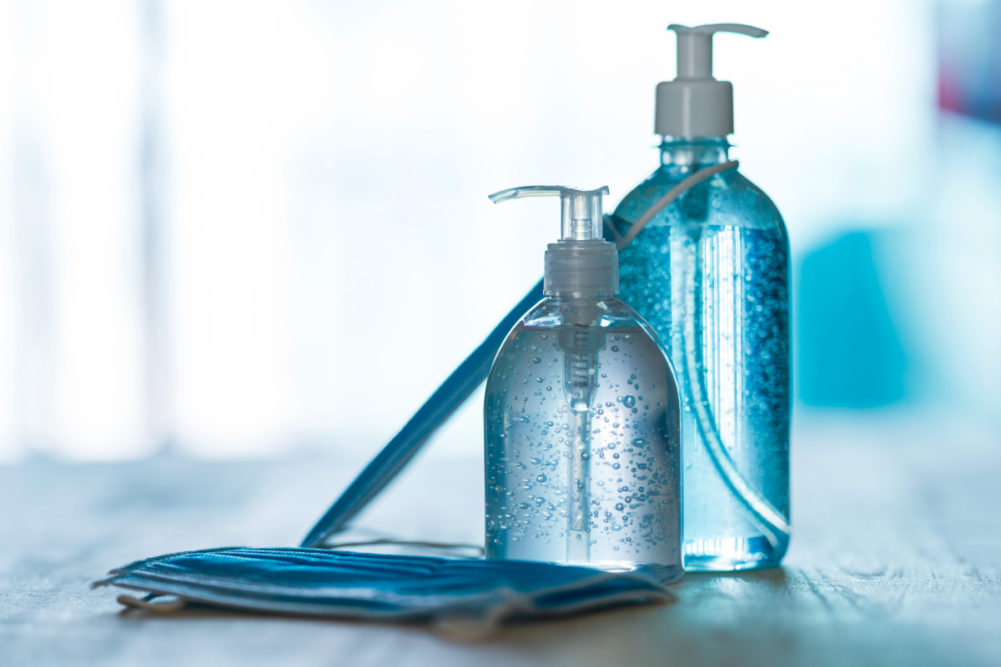Several food and beverage manufacturers are producing hand sanitizers, face masks and other medical equipment during the coronavirus pandemic.
The Hershey Co. is spending $1 million to acquire, install and staff a new manufacturing line dedicated to producing face masks. The new line, which will produce up to 45,000 masks per day, will be operational near the end of the month.
“Supporting our communities in difficult times is part of our legacy, and an important value that our current employees share,” says Michele G. Buck, president and chief executive officer at The Hershey Co. “From the building projects that created local jobs during the Great Depression, to producing military rations during World War II, we take great pride in making a difference where we can.”
At least one of The Coca-Cola Co.’s bottlers is producing hand sanitizer, and two of the company’s suppliers are working with local distilleries to fill bottles with hand sanitizer and deliver them to hospitals. A bottler in New England is diverting plastic sheeting to be remolded into face shields for health care workers.
Several PepsiCo Inc. bottlers also are donating plastic materials to hospitals to be used for face shields.
Unilever PLC has repurposed more than 30 personal care products factories in the United Kingdom to make hand sanitizer.
“This has been a massive collective effort by teams within our business and our suppliers, while many are remote working,” says Jason Sutcliffe, beauty and personal care supply chain manager at Unilever. “We have all wanted to get involved so we can do our bit to help those on the frontline. We’re just pleased we’re able to contribute in this way.”
Anheuser-Busch InBev has converted breweries around the world to help meet increased demand for sanitation products. In North America, Anheuser-Busch and Labatt Breweries’ supply and logistics networks have begun producing and distributing bottles of hand sanitizer.
Ingredient suppliers are pitching in, too.
Symrise Flavors North America is donating raw materials to help Georgia-based Califormulations LLC convert a segment of its production area from beverages to hand sanitizer. A portion of the product will be donated to local organizations.
“With the shortage of hand sanitizer currently being experienced in COVID hot spots, we felt it was important for us to act quickly since we have the capability to produce and package hand sanitizer right at our site,” says Toby Polhamus, president of Califormulations.
Plant-based ingredient supplier Roquette adapted one of its pilot lines at its site in Lestrem, France, to manufacture hydro-alcoholic disinfectant solution. The company aims to produce 5,000 liters per week. Product will be donated to local health care providers.
Fonterra ramped up ethanol production to help hand sanitizer producers meet increased demand. MGP Ingredients also increased its industrial alcohol production. Cargill donated more than 60,000 liters of disinfecting alcohol to the health sector in The Netherlands.
Novozymes is donating glycerin from its yeast production site in Canada to local distilleries that have adjusted their setup to produce hand sanitizer. The company also is working to deliver enzymes used in COVID-19 diagnostic kits to health care companies.
Packaging producers including Novolex and Dow Chemical Co. have shifted gears to help make hand sanitizer and other medical equipment. Dow Chemical Co. is manufacturing hand sanitizer at its facilities in Auburn, Mich., and South Charleston, W. Va. Novolex retooled its manufacturing capabilities to produce up to 25,000 face shields and 100,000 medical isolation gowns per week.
“We’ve seen a critical shortage in medical protective equipment in the United States,” says Phil Rozenski, vice president of public affairs at Novolex. “When we found out about this need, it was a no brainer. Our facilities are already uniquely equipped to produce food-grade products, so we are thrilled to be able to jump in and use our know-how and engineering expertise to make protective equipment that can really help those on the front lines.”




